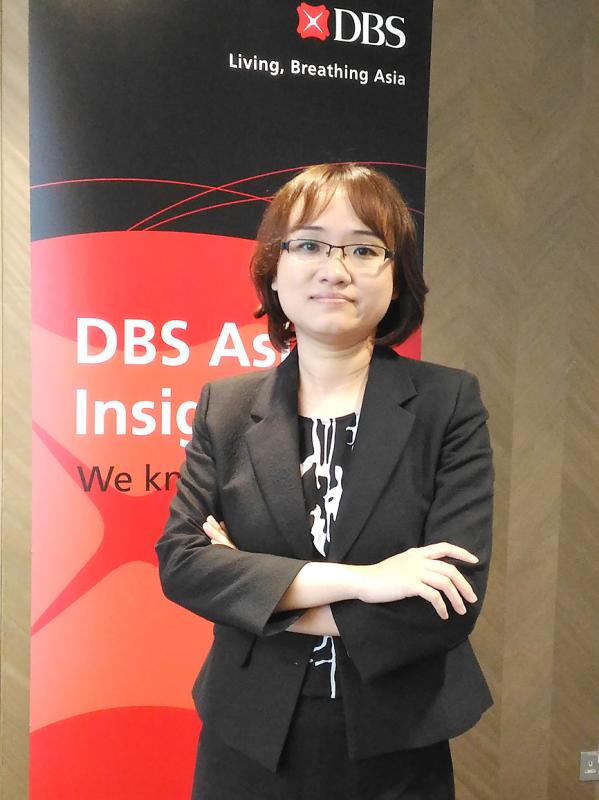The central bank is expected to maintain selective credit controls for the third time if local banks’ aggregate mortgage lending continues rising at a double-digit rate, DBS Bank Ltd’s Singapore-based chief economist Ma Tieying (馬鐵英) said yesterday.
The central bank on Dec. 7 last year imposed new selective credit controls on real-estate financing and further tightened its grip on March 18. These entailed imposing a cap on the loan-to-value (LTV) ratio, which now stands at 55 percent for individuals who want to buy a third house and 50 percent for those who plan to buy a fourth one, central bank data showed.
The LTV ratio is the ratio of the amount of mortgage to the appraised value of the property. The ratio is capped at 40 percent for corporate buyers, regardless of whether they are buying their first or second property, the central bank said.

Photo: Lee Chin-hui, Taipei Times
The central bank’s recent tightening moves were not the most severe in Taiwan’s history, Ma told a news conference.
“In 2014, the central bank set a limit on the LTV ratio for individual buyers who wanted to buy a second house, and reduced the cap on the ratio for those who wanted to buy a third house to 50 percent,” Ma said. “There is still room for the central bank to further squeeze credit controls.”
The bank is expected to take the pace of increase in mortgages into account, rather than the growth rate in housing prices, when deciding if it should tighten credit controls for the third time, she said.
“House prices have not risen by a double-digit percentage in Taiwan, but the growth in mortgages has even outpaced Taiwan’s GDP growth, suggesting that the mortgage-to-GDP ratio has increased,” Ma said.
The central bank would be concerned if the average mortgage-to-household income ratio expands, as it would indicate a rising household leverage ratio and increasing instability in the financial system, she said.
Asked if the central bank might be worried that credit controls would hurt the property market and curb an economic recovery, Ma said that the bank would prioritize financial stability over a single sector.
DBS has revised up its forecast for Taiwan’s inflation to 1.5 percent from 1 percent, and expects the central bank to use three tools to ease inflation concerns: stepping up open-market operations, tightening selective credit controls and hiking the reserve requirement ratio.
“There is a more than 50 percent chance that the central bank would use the first two tools, as it had done before. The possibility is lower for the third instrument,” Ma said.

JITTERS: Nexperia has a 20 percent market share for chips powering simpler features such as window controls, and changing supply chains could take years European carmakers are looking into ways to scratch components made with parts from China, spooked by deepening geopolitical spats playing out through chipmaker Nexperia BV and Beijing’s export controls on rare earths. To protect operations from trade ructions, several automakers are pushing major suppliers to find permanent alternatives to Chinese semiconductors, people familiar with the matter said. The industry is considering broader changes to its supply chain to adapt to shifting geopolitics, Europe’s main suppliers lobby CLEPA head Matthias Zink said. “We had some indications already — questions like: ‘How can you supply me without this dependency on China?’” Zink, who also

The number of Taiwanese working in the US rose to a record high of 137,000 last year, driven largely by Taiwan Semiconductor Manufacturing Co’s (TSMC, 台積電) rapid overseas expansion, according to government data released yesterday. A total of 666,000 Taiwanese nationals were employed abroad last year, an increase of 45,000 from 2023 and the highest level since the COVID-19 pandemic, data from the Directorate-General of Budget, Accounting and Statistics (DGBAS) showed. Overseas employment had steadily increased between 2009 and 2019, peaking at 739,000, before plunging to 319,000 in 2021 amid US-China trade tensions, global supply chain shifts, reshoring by Taiwanese companies and

Taiwan Semiconductor Manufacturing Co (TSMC, 台積電) received about NT$147 billion (US$4.71 billion) in subsidies from the US, Japanese, German and Chinese governments over the past two years for its global expansion. Financial data compiled by the world’s largest contract chipmaker showed the company secured NT$4.77 billion in subsidies from the governments in the third quarter, bringing the total for the first three quarters of the year to about NT$71.9 billion. Along with the NT$75.16 billion in financial aid TSMC received last year, the chipmaker obtained NT$147 billion in subsidies in almost two years, the data showed. The subsidies received by its subsidiaries —

At least US$50 million for the freedom of an Emirati sheikh: That is the king’s ransom paid two weeks ago to militants linked to al-Qaeda who are pushing to topple the Malian government and impose Islamic law. Alongside a crippling fuel blockade, the Group for the Support of Islam and Muslims (JNIM) has made kidnapping wealthy foreigners for a ransom a pillar of its strategy of “economic jihad.” Its goal: Oust the junta, which has struggled to contain Mali’s decade-long insurgency since taking power following back-to-back coups in 2020 and 2021, by scaring away investors and paralyzing the west African country’s economy.